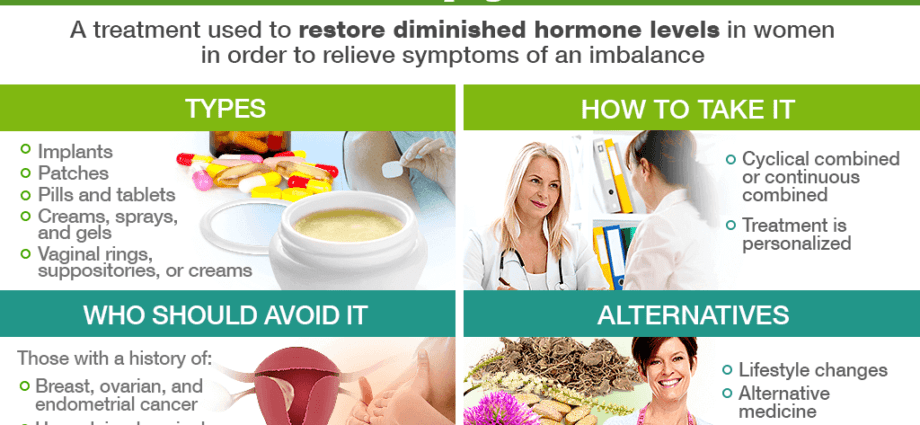Contents
HRT: what about hormone replacement therapy?
What is HRT?
Hormone replacement therapy consists, as its name suggests, in overcoming an insufficiency of hormonal secretions. This type of treatment can be prescribed at the time of peri-menopause and menopause, to compensate for the stoppage in the production of ovarian hormones. Hence its other name, menopause hormone therapy (THM).
As a reminder, menopause usually occurs around the age of 50. Following the depletion of the follicular stock, the production of ovarian hormones (estrogen and progesterone) stops, causing the end of menstruation. A woman is considered to have gone through menopause after at least 12 months of having stopped menstruating.
Stopping hormonal production can cause various symptoms, known as “climacteric disorders”: hot flashes, night sweats, vaginal dryness and urinary problems. The intensity and duration of these disorders vary between women.
HRT aims to limit these symptoms by compensating for the estrogen deficiency at the origin of these climacteric disorders. In non-hysterectomized women (still having their uterus), estrogen is routinely combined with an oral progestogen to prevent the onset of estrogen-related endometrial cancer.
This treatment is effective and reduces the frequency and severity of hot flashes, improves vaginal dryness and sexual problems. It also has a protective effect on all fractures (vertebrae, wrists, hips) in postmenopausal women, concluded the 2004 HAS report on HRT (1).
The risks of hormone replacement therapy
HRT was widely prescribed until the early 2000s. However, between 2000 and 2002 several American studies, including the Women’s Health Initiative better known under the name of WHI (2), reported an increased risk of breast cancer and breast cancer. cardiovascular disease in women taking HRT.
This work has led the health authorities to reassess the risks of HRT and adapt their recommendations accordingly in this same 2004 report. The work recalls the various additional risks observed in the event of taking HRT:
- an increased risk of breast cancer: combined estrogen-progestogen treatments lead to an increased risk of breast cancer linked to the duration of the prescription, especially after 5 years of use (3). Between 2000 and 2002, 3% to 6% of breast cancers in women between the ages of 40 and 65 were thought to be attributable to hormone therapy for menopause (4);
- an increased risk of venous thrombosis including pulmonary embolism;
- an increased risk of stroke. Between 2000 and 2002, 6,5% to 13,5% of stroke cases would be attributable in women aged 40 and 65 (5);
- an increased risk of endometrial cancer in the event of estrogen therapy, which is why a progestogen is always associated with it in women without hysterectomy.
On the other hand, estrogen-progestogen HRT has a protective role against colorectal cancer.
The indications for HRT
HRT should not be prescribed routinely around menopause. HAS recommends that you individually assess the benefit / risk ratio before prescribing HRT. The profile of each woman must be studied in terms of risks (cardiovascular risks, fracture risk, history of breast cancer) and benefits (against climacteric disorders and for the prevention of osteoporosis) in order to choose the treatment, its method of administration (oral or transdermal route) and its duration.
In 2014, the HAS renewed its recommendations (6) and recalled the following indications for HRT:
- when climacteric disorders are perceived as embarrassing enough to impair the quality of life;
- for the prevention of postmenopausal osteoporosis in women at increased risk of osteoporotic fracture and who are intolerant or contraindicated to other treatments indicated for the prevention of osteoporosis.
It also recommends prescribing the treatment at a minimum dose and for a limited duration, and reassessing the treatment at least once a year. On average, the current prescription period is 2 or 3 years depending on improvement in symptoms.
Contraindications to HRT
Due to the various risks mentioned, HRT is contraindicated in the following cases:
- personal history of breast cancer;
- history of myocardial infarction, coronary heart disease, stroke or venous thromboembolic disease;
- high cardiovascular risk (hypertension, hypercholesterolemia, smoking, overweight) (7).










